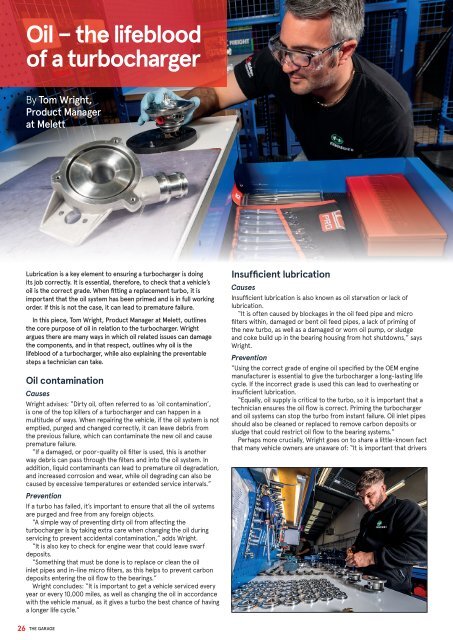The Garage 354
Create successful ePaper yourself
Turn your PDF publications into a flip-book with our unique Google optimized e-Paper software.
Oil – the lifeblood<br />
of a turbocharger<br />
By Tom Wright,<br />
Product Manager<br />
at Melett<br />
Lubrication is a key element to ensuring a turbocharger is doing<br />
its job correctly. It is essential, therefore, to check that a vehicle’s<br />
oil is the correct grade. When fitting a replacement turbo, it is<br />
important that the oil system has been primed and is in full working<br />
order. If this is not the case, it can lead to premature failure.<br />
In this piece, Tom Wright, Product Manager at Melett, outlines<br />
the core purpose of oil in relation to the turbocharger. Wright<br />
argues there are many ways in which oil related issues can damage<br />
the components, and in that respect, outlines why oil is the<br />
lifeblood of a turbocharger, while also explaining the preventable<br />
steps a technician can take.<br />
Oil contamination<br />
Causes<br />
Wright advises: “Dirty oil, often referred to as ‘oil contamination’,<br />
is one of the top killers of a turbocharger and can happen in a<br />
multitude of ways. When repairing the vehicle, if the oil system is not<br />
emptied, purged and changed correctly, it can leave debris from<br />
the previous failure, which can contaminate the new oil and cause<br />
premature failure.<br />
“If a damaged, or poor-quality oil filter is used, this is another<br />
way debris can pass through the filters and into the oil system. In<br />
addition, liquid contaminants can lead to premature oil degradation,<br />
and increased corrosion and wear, while oil degrading can also be<br />
caused by excessive temperatures or extended service intervals.”<br />
Prevention<br />
If a turbo has failed, it’s important to ensure that all the oil systems<br />
are purged and free from any foreign objects.<br />
“A simple way of preventing dirty oil from affecting the<br />
turbocharger is by taking extra care when changing the oil during<br />
servicing to prevent accidental contamination,” adds Wright.<br />
“It is also key to check for engine wear that could leave swarf<br />
deposits.<br />
“Something that must be done is to replace or clean the oil<br />
inlet pipes and in-line micro filters, as this helps to prevent carbon<br />
deposits entering the oil flow to the bearings.”<br />
Wright concludes: “It is important to get a vehicle serviced every<br />
year or every 10,000 miles, as well as changing the oil in accordance<br />
with the vehicle manual, as it gives a turbo the best chance of having<br />
a longer life cycle.”<br />
Insufficient lubrication<br />
Causes<br />
Insufficient lubrication is also known as oil starvation or lack of<br />
lubrication.<br />
“It is often caused by blockages in the oil feed pipe and micro<br />
filters within, damaged or bent oil feed pipes, a lack of priming of<br />
the new turbo, as well as a damaged or worn oil pump, or sludge<br />
and coke build up in the bearing housing from hot shutdowns,” says<br />
Wright.<br />
Prevention<br />
“Using the correct grade of engine oil specified by the OEM engine<br />
manufacturer is essential to give the turbocharger a long-lasting life<br />
cycle. If the incorrect grade is used this can lead to overheating or<br />
insufficient lubrication.<br />
“Equally, oil supply is critical to the turbo, so it is important that a<br />
technician ensures the oil flow is correct. Priming the turbocharger<br />
and oil systems can stop the turbo from instant failure. Oil inlet pipes<br />
should also be cleaned or replaced to remove carbon deposits or<br />
sludge that could restrict oil flow to the bearing systems.”<br />
Perhaps more crucially, Wright goes on to share a little-known fact<br />
that many vehicle owners are unaware of: “It is important that drivers<br />
26 THE GARAGE<br />
22-27 Feature Oils and filters.indd 5 30/08/2023 15:17

















